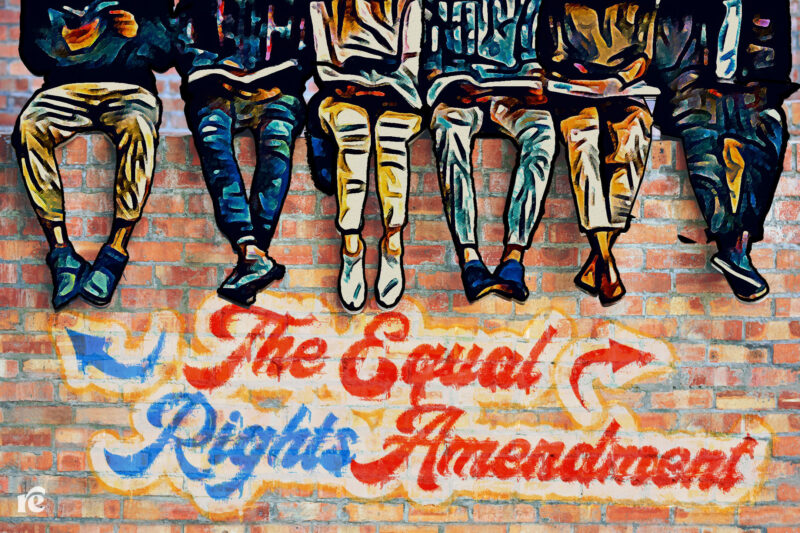If Elected, Kamala Harris Should Embrace the ERA
Opinion: To maintain Gen Z's support, Harris must commit to making the Equal Rights Amendment the law of the land.

This story is part of our monthly series, Campus Dispatch. Read the rest of the stories in the series here.
In August, I attended the Democratic National Convention. As a Black feminist Gen Z movement leader, energy and enthusiasm oozed from a diverse base of young and older attendees alike.
In the 2020 presidential election, Democrats reluctantly won young people’s support for President Joe Biden. “Settle for Biden” and “lesser of two evils” rhetoric flooded social media feeds, begrudgingly pushing young voters to throw their support behind a candidate, motivated by the fear of another Donald Trump win.
Four years later, the energy today has positively transformed in no small part to Vice President Kamala Harris’ rise to the top of the Democratic presidential ticket. Young people were immediately relieved to have a fighting chance at beating Trump after Biden dropped out of the race, and this relief quickly translated into a fight for something bigger and better.
Young voters rank reproductive freedom as one of their most important issues this election. Harris and her vice presidential pick, Minnesota Gov. Tim Walz, aggressively engage young voters invested in protecting reproductive freedom. But without a substantive, actionable plan to permanently secure legal abortion access, Harris’ popularity will inevitably dwindle.
Democratic Party leaders and officials often pledge to protect legal abortion access by reciting the necessity of “Restoring Roe” in its catchy rhetorical fashion. Subsequently, they offer little to no explanation as to how they seek to do so.
As a Gen Z organizer, I have one suggestion: Publish the Equal Rights Amendment (ERA), making sex equality the law of the land and guaranteeing the right to abortion.
I’m not the first to suggest this: During a 2019 campaign event, then-Senator and Democratic presidential candidate Harris committed to passing the ERA in her first 100 days of presidency.
The ERA reads, “Equality of rights under the law shall not be denied or abridged by the United States or by any state on account of sex.” Despite its lack of an explicit mention of an abortion guarantee, the ERA has already proven its ability to protect abortion.
One signature from the president publishing the ERA could restore the constitutional right to abortion the Supreme Court took away in its 2022 Dobbs v. Jackson Women’s Health Organization decision.
The ERA, often thought of as a relic of the late 1970s feminist movement, remains alive and well today. In 2020, Virginia’s legislature voted to ratify the ERA, finally securing it the necessary 38 state ratifications in order to become a U.S. constitutional amendment and explicitly prohibit discrimination on the basis of sex. In November, New Yorkers will decide whether to enshrine the ERA in their state constitution.
Although constitutional legal debate surrounds the ERA’s legitimacy given that Nevada, Illinois, and Virginia ratified it decades past Congress’ 1982 deadline, the fact remains that the ERA passed by a two-thirds majority vote of Congress and earned the 38 required state ratifications outlined under Article V of the Constitution.
The final step toward finalizing the ERA requires the president to instruct their national archivist to certify the ERA’s remaining ratifications, and publish it into the Constitution.
More than 215 members of Congress, led by Sen. Kirsten Gillibrand (D-NY), Rep. Ayanna Pressley (D-MA), and Rep. Cori Bush (D-MO), have co-sponsored a bill to eradicate the deadline for ratification and affirm the ERA as the 28th Amendment, along with leading Harvard Law School constitutional legal scholar Laurence Tribe and the American Bar Association.
Publishing the ERA remains key to reimagining something bigger than Roe v. Wade to secure legal abortion access at the federal level. Roe’s weak privacy rationale was doomed to failure decades later by a conservative Trump-appointed Supreme Court majority.
State-level ERAs have successfully challenged abortion bans and restrictions, even in conservative states like Utah, Iowa, Pennsylvania, Nevada, Connecticut, and New Mexico. Abortion bans’ unique burden has largely fallen on people who identify as women—though nonbinary and trans people can also become pregnant—amounting to sex discrimination, which violates the ERA. Especially as Gen Z pursues higher education and starts careers, lacking their right to abortion as a critical element of reproductive freedom limits their ability to plan their lives and futures.
Since the Dobbs decision, every state-level abortion rights ballot measure has succeeded, and every ballot measure against abortion rights has failed. In conservative and liberal states alike, abortion is popular among voters.
However, many other states lack mechanisms for citizen-led pro-abortion ballot measures, leaving the future of legal abortion in those areas up to anti-abortion state legislatures. People in states like Texas, Alabama, and Mississippi bear the difficult burden of suffering under the most restrictive abortion bans with no other hope but federal change.
Aggressive Republican attacks on abortion necessitate bold, creative, and sweeping action from Democrats. We need a constitutional amendment. We need the ERA. We need Harris to follow through on her promise of realizing the ERA by publishing it if elected.
My generation was previously dejected and resigned to the fate of a second Trump presidency as Biden stumbled at the top of the Democratic ticket, but Harris’ historic bid is swelling momentum and filling young people with optimism.
Harris’ historic nomination could cement her place as the first Black and Asian American woman in the Oval Office. However, young people today demand more—minority representation will not stem bold progressive policy demands from young people-powered movements. Young voters ultimately prioritize issues over party lines. Gen Z’s honeymoon phase will not last, and to sustain our support, we need a real solution to the abortion access crisis.
Restoring the constitutional right to abortion by publishing the ERA could define Harris’ legacy. The question remains: Can and will she deliver on her promise?
